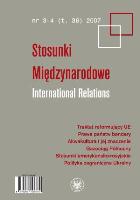GAZOCIĄG PÓŁNOCNY W ŚWIETLE PRAWA MORZA I POLITYKI BAŁTYCKIEJ
The Northern Gas Pipeline in the Light of Maritime Law and Baltic Policy
Author(s): Dariusz Rafał BugajskiSubject(s): Politics / Political Sciences
Published by: Wydawnictwa Uniwersytetu Warszawskiego
Keywords: gazociąg; gazociag; pipeline; baltic; bałtyk; baltyk
Summary/Abstract: Since its disclosure to the public, the Northern Gas Pipeline has become one of the most talked about and controversial construction projects in Europe in recent years. The project will involve the building of an underwater pipeline from the Russian Federation to Germany through exclusive economic zones within which international law guarantees freedom of transportation including the laying of this type of installation. The choice by the Nord Stream consortium of one of the longest possible routes for the pipeline, whose construction is significantly more expensive than if it were built on land, shows that the decision was dictated by political and not economic considerations. It has led to a political divide in the region not seen for many years, between states that will potentially benefit from the project and those whose interests will be negatively affected. The plan has raised problems relating to the extent of national jurisdiction over the sea, and even the delineation of sea areas (the Polish-Danish dispute). A significant issue in this regard is the existence of a strip of international waters in the Gulf of Finland – a “high seas corridor”. The elimination of this strip by the widening of the territorial seas of Finland and Estonia and the creation of a common sea border between those countries could thwart the pipeline. Also very important are ecological considerations associated with the construction and utilisation of the pipeline as well as an assessment of the environmental impact, with particular focus on the danger of releasing toxins from chemical munitions lying on the Baltic Sea bed since the Second World War. The article draws attention to ecological issues relating to the construction of the pipeline, the problem of the high seas corridor, and the connection between the project and the delimitation of the Polish and Danish exclusive economic zones in the region of Bornholm.
Journal: Stosunki Międzynarodowe
- Issue Year: 36/2007
- Issue No: 3-4
- Page Range: 71-88
- Page Count: 18
- Language: Polish

